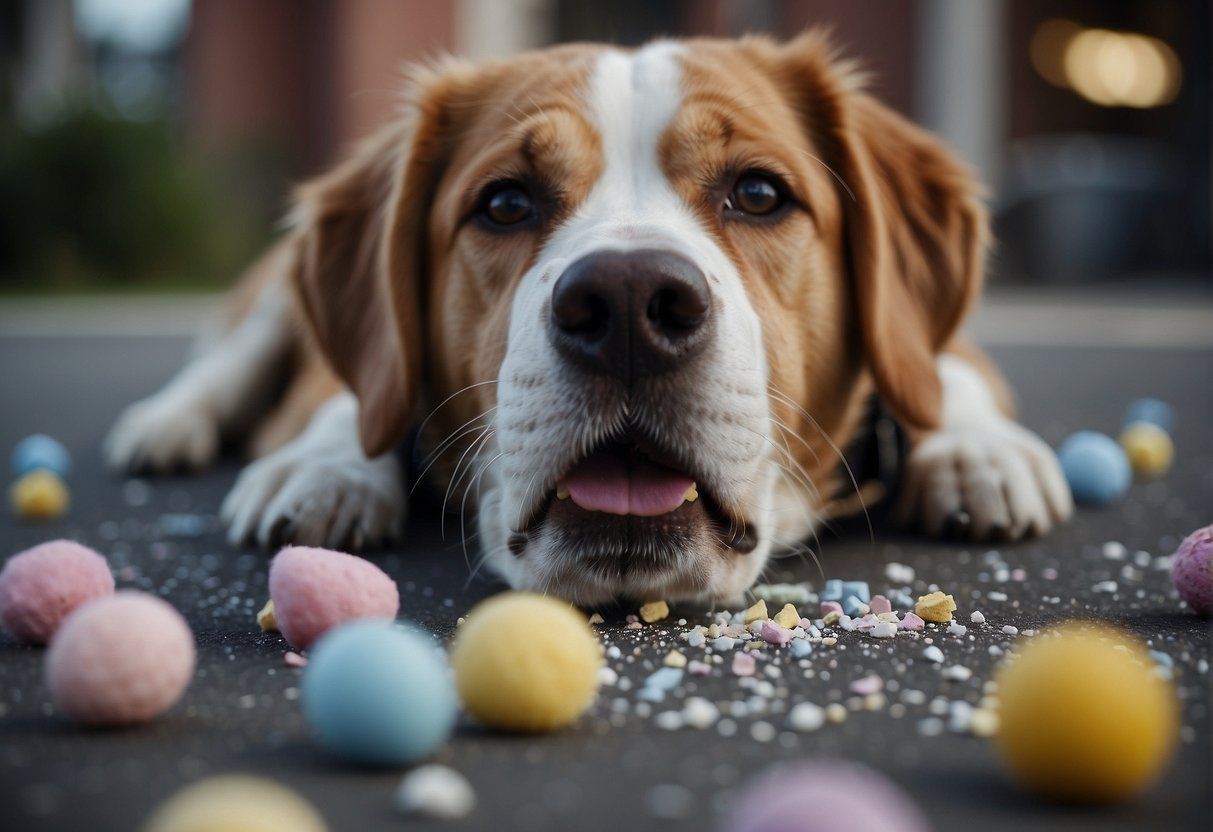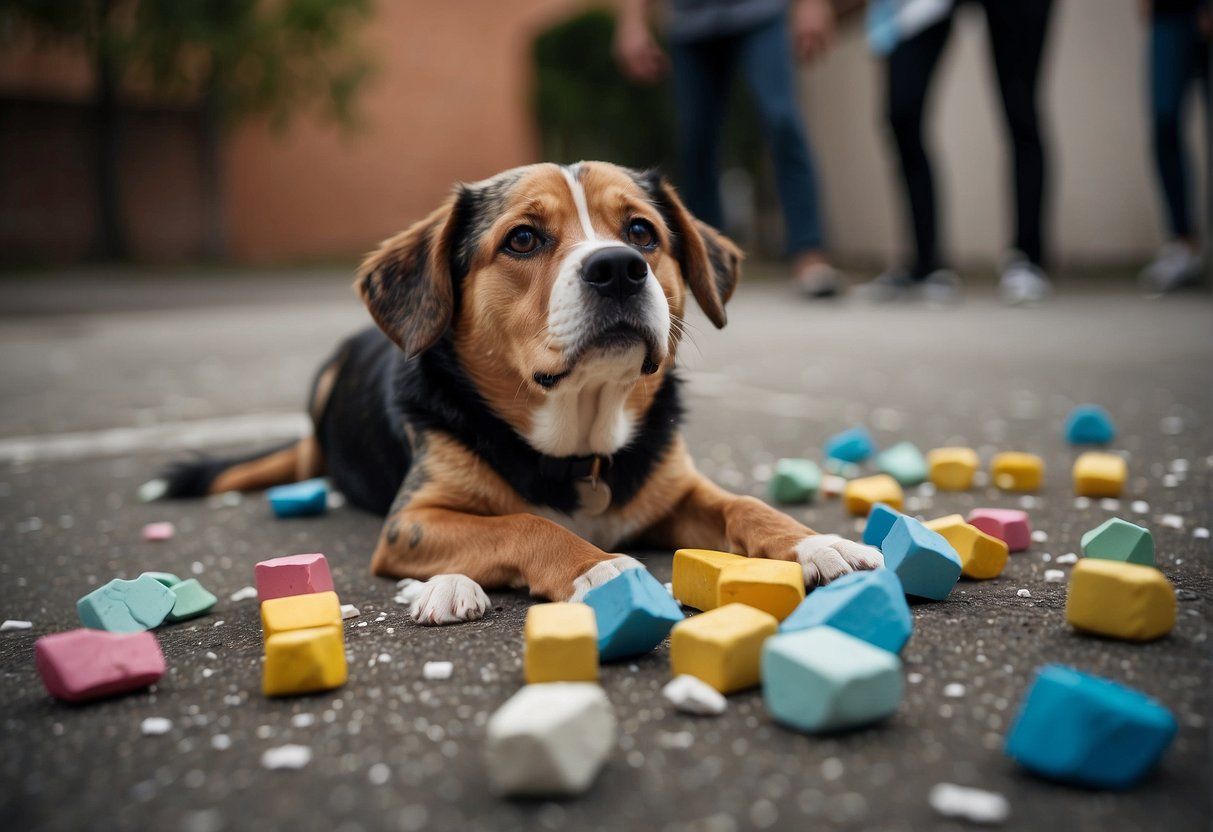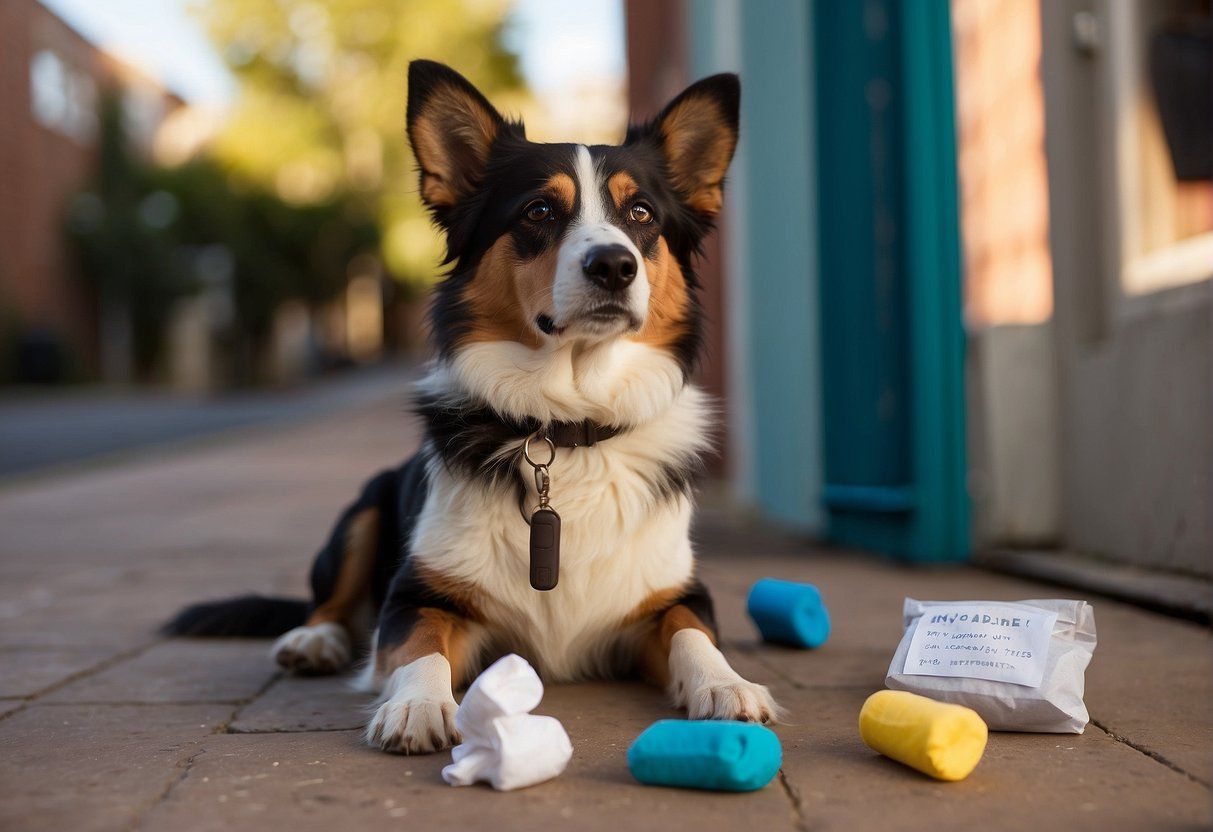Dog Ate Chalk? Here's What You Need To Know!
Dog Ate Chalk? Here's What You Need To Know!

Vet Reviewed

By: Sarah Hodgson
February 14, 2024
Table of Contents
Key Takeaways
Chalk ingestion in dogs is not uncommon but can cause health issues.
If your dog ingests chalk, act quickly and contact your veterinarian for guidance.
Prevention is key in avoiding chalk ingestion and other non-food item ingestion in dogs.
Dogs are known to eat anything and everything they can find, and sometimes that includes non-food items like chalk. Chalk ingestion in dogs is not uncommon, but it can be a cause for concern for pet owners. In this article, we will discuss what you need to know if your dog ate chalk.
Let's dive in!
What Is Chalk?
Chalk is a soft, powdery substance that is commonly used on chalkboards or in art projects. It's incredible to think that something as simple as chalk can leave such vibrant marks on a blackboard or sidewalk. Whether it's in the classroom or on the playground, chalk brings a burst of color and creativity to our lives.
What Is Chalk Made Of?
Chalk is a soft, white sedimentary rock that is primarily composed of calcium carbonate. It is commonly used in schools and offices as a writing tool, as well as in sports such as gymnastics and weightlifting to improve grip. Chalk is also used in the food industry as an anti-caking agent and in agriculture as a soil conditioner.
Understanding Chalk Ingestion
Is Chalk Toxic to Dogs?
While chalk is generally considered safe for humans to use, it can be harmful to dogs if ingested in large quantities. The main concern with chalk ingestion is the potential for an intestinal blockage, which can be life-threatening if left untreated.
In addition to the risk of blockage, some types of chalk may contain additives or impurities that could be toxic to dogs. For example, some colored chalks may contain pigments that are toxic if ingested, while some chalks used in the food industry may contain harmful chemicals.
If a dog has ingested chalk, it is important to monitor them closely for signs of gastrointestinal distress, such as vomiting, diarrhea, or abdominal pain. If the dog shows any of these symptoms, they should be taken to a veterinarian immediately.
Overall, while chalk ingestion may not be immediately life-threatening, it is important to take it seriously and seek veterinary care if necessary. As with any potential toxin, prevention is key, and pet owners should take steps to keep chalk and other potentially harmful substances out of their dog's reach.
Immediate Actions After Ingestion
If a dog has ingested chalk, it is important to take immediate action. Here are some steps to follow:
Assessing the Amount Consumed
The first step is to assess the amount of chalk the dog has consumed. If the amount is small, then the dog may not experience any adverse effects. However, if the dog has ingested a large amount of chalk, then it can be toxic and cause serious health problems.
Symptoms to Watch For
Even if the amount of chalk ingested is small, it is important to watch out for any symptoms that may develop. Some common symptoms of chalk ingestion in dogs include vomiting, diarrhea, loss of appetite, lethargy, and abdominal pain. In severe cases, the dog may experience seizures, tremors, or difficulty breathing.
If any of these symptoms develop, it is important to seek veterinary care immediately. The veterinarian may perform tests to determine the extent of the damage and provide appropriate treatment.
In conclusion, it is important to take immediate action if a dog has ingested chalk. Assessing the amount consumed and watching out for symptoms can help prevent serious health problems. Seeking veterinary care if any symptoms develop is crucial for the dog's well-being.

What To Do If My Dog Ate Chalk
If a dog has eaten chalk, the first step is to monitor the dog's behavior and symptoms. In most cases, the dog will pass the chalk without any issues. However, if the dog shows any signs of distress, such as vomiting or diarrhea, it is important to seek veterinary care.
To help the dog pass the chalk, it is recommended to feed the dog a bland diet of boiled chicken and rice for a few days. This will help to soothe the dog's digestive system and prevent any further irritation.
It is also important to ensure that the dog has access to plenty of water to prevent dehydration. If the dog is not drinking enough water, it may be necessary to give the dog water through a syringe or dropper.
Medical Treatments Available
If the dog is showing severe symptoms, such as vomiting or diarrhea, it may be necessary to seek veterinary care. The veterinarian may recommend medication to help soothe the dog's digestive system and prevent further irritation.
In some cases, the veterinarian may need to perform diagnostic tests, such as blood work or x-rays, to determine the extent of the damage caused by the chalk.
If the dog has ingested a large amount of chalk or if the chalk has caused a blockage in the dog's digestive system, surgery may be necessary to remove the blockage.
When to Contact the Vet

If your dog has ingested chalk, it is important to monitor them closely and seek veterinary attention if necessary. Here are some signs to look out for and how vets diagnose chalk ingestion.
Signs of Chalk Poisoning
Chalk poisoning can cause a range of symptoms in dogs, including vomiting, diarrhea, abdominal pain, loss of appetite, lethargy, and difficulty breathing. In severe cases, it can even lead to seizures or coma.
If you notice any of these symptoms in your dog after they have ingested chalk, it is important to contact your veterinarian immediately. They may recommend bringing your dog in for an examination or providing guidance on how to manage their symptoms at home.
How Vets Diagnose Chalk Ingestion
To diagnose chalk ingestion, your veterinarian will likely perform a physical exam and may order blood tests or imaging studies to assess your dog's overall health and look for signs of chalk in their digestive tract.
If your dog is exhibiting symptoms of poisoning, your veterinarian may also recommend administering activated charcoal or other treatments to help remove the chalk from their system and prevent further harm.
How To Prevent a Dog From Eating Chalk?

To prevent dogs from eating chalk, it is important to store chalk supplies in a safe and secure location. Chalk should be stored in a high place where dogs cannot reach it. If possible, keep chalk in a locked cabinet or drawer. It is also important to dispose of used chalk properly. Do not leave used chalk lying around where dogs can easily access it.
Training Dogs to Avoid Non-Food Items
Training dogs to avoid non-food items can be helpful in preventing them from eating chalk. This can be done through positive reinforcement training. When a dog shows interest in a non-food item, redirect their attention to a toy or treat. Reward them for choosing the toy or treat instead of the non-food item. Consistency is key when training a dog, so make sure to reinforce this behavior consistently over time.
Additionally, providing dogs with plenty of toys and chews can help satisfy their urge to chew and prevent them from seeking out non-food items like chalk. It is also important to supervise dogs when they are playing or exploring new environments to ensure they do not eat anything harmful.
By taking these preventative measures, dog owners can help keep their furry friends safe and healthy.
What To Consider In The Long Run If Dog Ate Chalk
If a dog ate chalk, it is important to consider the potential long-term health effects. Chalk is made of various substances, including calcium carbonate, which can cause gastrointestinal irritation and blockages if ingested in large quantities.
Over time, the buildup of chalk in a dog's digestive system can lead to more serious health problems. This can include blockages in the intestines, which can cause vomiting, diarrhea, and abdominal pain. In severe cases, surgery may be necessary to remove the blockage.
Additionally, if the chalk contains any hazardous chemicals, such as lead or arsenic, this can lead to long-term health effects. These chemicals can accumulate in a dog's body and cause damage to vital organs such as the liver and kidneys.
To prevent long-term health problems, it is important to seek veterinary care if a dog has ingested chalk. A veterinarian can assess the dog's condition and determine if any treatment is necessary. In some cases, the dog may need to be monitored closely to ensure that the chalk passes through their system without causing any blockages.
The Bottom Line
So there you have it, it is important to be aware of the potential long-term health effects of a dog eating chalk. By taking the necessary precautions and seeking veterinary care when necessary, pet owners can help ensure that their furry friends stay healthy and happy.
Frequently Asked Questions
Why might a dog be attracted to eating chalk, and how can I address this behavior?
Dogs may be attracted to eating chalk due to its texture, taste, or smell. Addressing this behavior involves identifying and addressing any underlying medical or behavioral issues, providing appropriate chew toys and regular exercise, and training your dog to avoid eating non-food items. Consult with a veterinarian or professional dog trainer for additional guidance.
What should I do if my dog ingests chalk?
If your dog ingests chalk, it is important to seek veterinary attention immediately. Depending on the amount ingested and the size of your dog, it can cause blockages or irritation in the digestive system.
Can eating chalk indicate an underlying condition like pica in dogs?
Yes, eating non-food items such as chalk can be a sign of pica in dogs. Pica is a condition where dogs crave and eat non-food items. It can be caused by nutritional deficiencies, boredom, anxiety, or other underlying medical conditions.

Subscribe to Petfluence!
Get updates on the latest posts and more from Petfluence straight to your inbox.